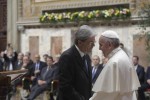2017 (EN)
24 March 2017
Tutte le Attività (EN) -
Anno 2017

Pope Francis receives the Heads of State and Government for the 60th anniversary of the Treaties of Rome, he warns from "centrifugal thrusts" and walls:"Solidarity is the most effective antidote to modern populism". It calls for the building of "truly secular societies". Gentiloni:"EU is not only economic parameters".
Europe is a "way of conceiving man from his transcendent and inalienable dignity" and not "a set of rules to observe". And one must resist the "temptation to reduce fundamental ideals to productive, economic and financial needs". Pope Francis emphasizes this by speaking to the Heads of State and Government of the EU countries, received in the Vatican on the eve of the celebration of the 60th anniversary of the Treaty of Rome.
"Today we are gathered here today to celebrate our common project and tomorrow we will sign a document of common intentions, only together and united can we overcome the great challenges, we can defeat terrorism, solve the problem of immigration,"says the President of the Europarliament, Antonio Tajani, in his initial message of greeting. And Bergoglio, returning to the themes addressed in the comeback on the constitutive elements of that "common project" that was signed sixty years ago. They are summed up in five pillars:"The centrality of man, an active solidarity, openness to the world, the pursuit of peace and development, openness to the future".
On the theme of solidarity Bergoglio dwells at length. It presents it as "the most effective antidote to modern populism", as a response to "centrifugal thrusts". But also as a pivot on which to grow the "ability to open up to others". The Pope quotes the German Chancellor Adenauer and his promise of a Union that would not have erected "impassable barriers"around it. Francesco adds:"In a world that knew well the drama of walls and divisions, it was very clear the importance of working for a united and open Europe and the common will to work to remove that unnatural barrier that divided the continent from the Baltic Sea to the Adriatic". Today, he comments, the "memory of fatigue" that was accomplished in order to overcome the barriers of sixty years ago has been lost. And if at that time "generations aspired to see the signs of a forced enmity fall", now we are discussing "how to leave out the' dangers' of our time: starting from the long column of women, men and children".
In these sixty years, the Pope admits, the world has changed:"If the founding fathers, who were animated by the hope of a better future and survived a devastating conflict, were animated by the hope of a better future and determined by the will to pursue it, avoiding the onset of new conflicts, our time is more dominated by the concept of crisis". But the word crisis, the pontiff explains,"does not have a negative connotation in itself, it does not indicate only a bad moment to overcome: it originates from the gecko and - Francis recalls - it means investigating, judging". The contemporary one, therefore, is "a time of discernment that invites us to examine the essentials and build on them". A time of "challenges and opportunities".
In this sense, the European Union, in the Pope's words,"unlike a human being of sixty years old, does not have in front of it an inevitable old age, but the possibility of a new youth". Success, however, is linked to the ability to "discern the path of a new European humanism, made up of ideals and concreteness". It is a question of "building authentically secular societies, free from ideological contrasts, in which oriundo and autochthonous, the believer and the unbeliever are equally placed". It is also a question of investing in development and peace. But" development is not given by a set of productive techniques", it "concerns the whole human being: the dignity of his work, adequate living conditions, the possibility of access to education and the necessary medical care". Francis quotes Paul VI:"Development is the new name of peace. But he warns:"There is no real peace when there are people marginalized or forced to live in poverty. There is no peace where there is no work or the prospect of a decent wage. there is no peace on the outskirts of our cities, where drugs and violence are spreading.
That the European Union should not be "only that of numerical parameters, but moral examples, values, in the richness of diversity", as the Italian Prime Minister, Paolo Gentiloni, stressed. "The Church - she said - urged us to strengthen dialogue, we remember Saint John Paul II and his commitment to reunite the two' lungs' as he called them, the East and the West. The Church has also encouraged integration, for example Pope Paul IV who spoke of the magnificent reality of the Union". Remembering that "we are the Europe of humanism and the Renaissance, of Pascal, of the Enlightenment and of reason as a founding idea of human development", Gentiloni reiterated that "we Europeans draw riches from numerous and different roots". "The Pope in the European Parliament spoke of humanization and once again we must follow who we are: we have overcome two world wars and Europe has become a great family. The journey of Europe continues, enriched by our diversity. The journey began some time ago and continues in the name of justice, progress, peace in Europe and the whole world".
- THE SPEECH OF POPE FRANCIS TO THE HEADS OF STATE AND GOVERNMENT OF THE EUROPEAN UNION, ON THE OCCASION OF THE 60TH ANNIVERSARY OF THE SIGNING OF THE TREATIES OF ROME IT - FR - EN
- THE VISIT OF POPE TO STRASBOURG
- VIDEO
- PRESS WEB






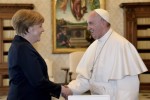
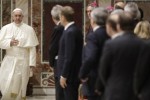
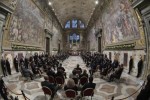
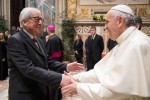

.jpg)
.jpg)
